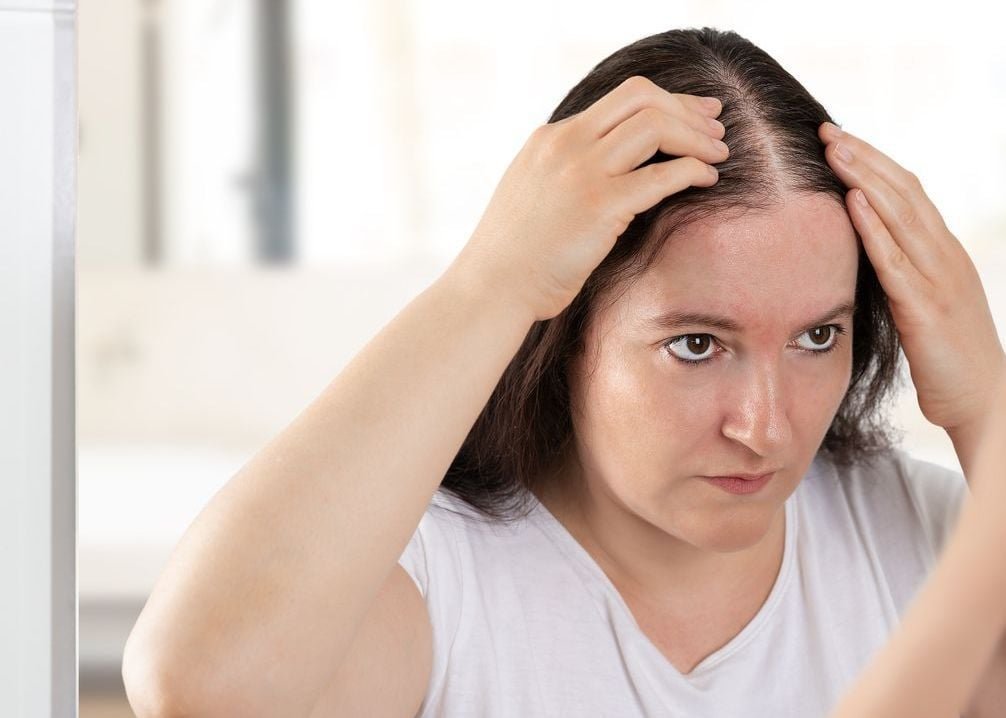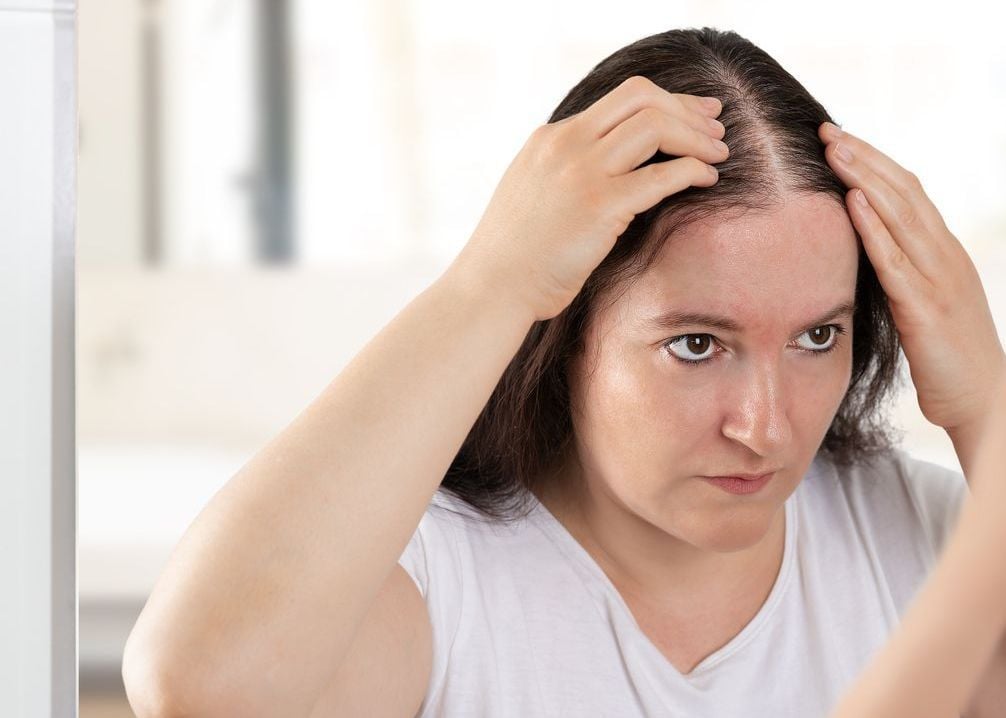
Can Ozempic cause hair loss?

This article was reviewed by Lynn Marie Morski, MD, JD.
Does Ozempic® Cause Hair Loss?
Key takeaways:
- Hair loss isn’t an official side effect of Ozempic®.
- In clinical trials of Wegovy®, which contains the same active ingredient as Ozempic®, 3 percent of people reported hair loss.
- Taking Ozempic® could lead to hair loss due to significant weight loss, nutritional deficiencies, or stress.
- It’s most likely temporary, and hair should start growing back in a few months.
The prescribing information for Ozempic® doesn’t list hair loss as a side effect. But some people say they’ve noticed changes in their hairline since taking the medication.
So, does Ozempic® cause hair loss? It can — indirectly. It’s probably due to the rapid weight loss that can happen on Ozempic® rather than the medication itself.
Keep reading to learn why hair loss can happen on Ozempic® and how to treat it if it’s happening to you.
Does Ozempic® Cause Hair Loss? What the Research Says
Ozempic® can cause hair loss. But if it happens, it may be because of the weight loss, nutritional deficiencies, or stress it can cause, as opposed to the medication itself.
In clinical trials of Ozempic®, there wasn’t a significant enough number of people who reported hair loss for it to be listed as a side effect.
But as more people use the medication, there are anecdotal reports of it happening. There are also increasing reports in scientific literature that this may be a more common side effect than previously thought.
Unlike Ozempic®, 3 percent of people in Wegovy® clinical trials reported hair loss as a side effect. Wegovy® contains the same active ingredient (semaglutide) as Ozempic®, just in a higher dose. This may be further indication that semaglutide hair loss may not just be due to weight loss and other associated factors.
Research on Ozempic® and Hair Loss
Research beyond the initial clinical trials is starting to find links. A 2025 study — that hasn’t been peer-reviewed yet — found that hair loss was more common in those on semaglutide than bupropion-naltrexone, another weight loss medication. And it was more common in women than men.
More research is needed, though. Some say GLP-1 medications like Ozempic® may disrupt the hair growth cycle and trigger hair loss. Others say GLP-1 drugs may even improve hair loss through improved insulin sensitivity and scalp circulation.
Btw, GLP-1s are glucagon-like peptide-1 receptor agonists, a class of medication that includes semaglutide.
How Does Ozempic® Cause Hair Loss?
Ozempic® may cause hair loss through significant weight loss, nutritional deficiencies, or stress. More research is needed to figure out exactly what’s happening, though.
Here are the likely reasons Ozempic® causes hair loss.
Hair Loss with Drastic Weight Loss
Ozempic® is approved by the Food and Drug Administration (FDA) as a diabetes medication, but it’s sometimes prescribed off-label for overweight and obesity. Regardless of the reason the patient is taking the drug, it can cause significant weight loss, and weight loss can trigger a form of hair loss called telogen effluvium.
Telogen Effluvium Hair Loss
Telogen effluvium causes widespread hair shedding across the entire scalp. It can happen a few months after a stressful event, so you might not notice any hair falling out when you first start treatment or lose weight.
This type of hair loss happens when a large number of hair follicles prematurely enter the resting (telogen) phase of the hair growth cycle. In the resting phase, hair growth stops for one to six months before hairs enter the growth (anagen) phase.
Hairs that were in the resting phase shed, and you might notice more loose strands than usual hair in your brush or around the shower drain.
Beyond weight loss itself, caloric restriction can cause telogen effluvium. You might eat too few calories if Ozempic® really reduces your appetite or causes side effects like nausea.
Hair Loss Due to Nutritional Deficiencies
Your appetite is probably smaller on Ozempic®. So you might eat smaller meals and eat different foods than before you started treatment.
These changes mean you might not get all the nutrients your body needs to grow healthy hair. Without enough nutrients, you might notice hair loss, hair thinning, or hair generally not looking its best.
Nutritional deficiencies that can cause hair loss include:
- Iron
- Zinc
- Vitamin D
- Biotin (vitamin B7)
- Protein
Hair Loss from Stress
Other than weight loss, other stressful events can cause telogen effluvium.
Going on Ozempic®, managing type 2 diabetes or obesity, and making major changes to your lifestyle can be stressful in itself. Or maybe you’re going through tough times while on Ozempic®.
For example, triggers for telogen effluvium can include:
- Losing a job or a loved one
- Going through a divorce
- Giving birth
- Having an operation
- Stopping birth control pills
- Crash dieting
Is Hair Loss from Ozempic® Permanent?
Hair loss from Ozempic® probably isn’t permanent. If telogen effluvium is causing your hair loss, you might find that it stops as your body adjusts to weight loss — or another stressor. Hair should start growing back to normal fullness in six to nine months.
How to Stop Hair Loss from Ozempic®
You can improve hair loss from Ozempic® by using minoxidil, getting enough nutrients, and lowering stress levels. You might also find that hair loss gets better on its own in time as your body adjusts to weight loss.
A healthcare provider, like a board-certified dermatologist or hair loss specialist, can let you know the best treatment for you, depending on what’s causing your hair loss. They can check for underlying causes.
Here are some of the best hair loss treatment options.
Use Minoxidil
Minoxidil (the active ingredient in Rogaine®) is FDA-approved to treat male pattern baldness and female pattern hair loss (androgenetic alopecia). But it’s used off-label to treat other types of hair loss, including telogen effluvium.
You can get minoxidil in a few different forms, including as a:
- Foam
- Solution
- Spray
- Pill
- Chew
- Gummy
Topical minoxidil is an over-the-counter product — no prescription needed. It can help prevent further hair loss and encourage new hair growth. It does this by shortening the resting phase, encouraging hair to enter the growth phase.
It’s a game of patience, though. It can take at least two months to start seeing results from minoxidil. Also, you need to apply it every day, in some cases twice a day, indefinitely. In other words, when you stop using it, you’ll generally lose the hair you gained.
Get Enough Nutrients
Make sure you’re eating a balanced diet with all the nutrients your body needs for healthy hair growth.
Focus on:
- Fruits and veggies
- Nuts and seeds
- Low-fat dairy products
- Lean protein, like chicken, tofu, and fish
- Whole grains, like brown rice, oatmeal, and quinoa
- Healthy fats, like olive oil and avocados
If you’re finding it hard to eat enough while on Ozempic®, try eating smaller, more regular meals and snacks rich in nutrients.
Consider meal-replacement shakes and bars, too. These can help you get all your nutrients and protein when you’ve got a smaller appetite.
A healthcare professional, like a registered dietitian, can test you for deficiencies and recommend nutritional supplements, if needed.
Reduce Stress
You can’t always avoid stressful life events, but you can try to manage your stress levels with stress-management techniques.
Try:
- Exercise. Exercise releases endorphins, which can improve your mood and reduce stress. Even five minutes can help you feel better. Look for forms of movement you enjoy, like jogging, swimming, or dance classes.
- Meditation and mindfulness. Meditation and mindfulness can reduce stress, anxiety, and depression. Try breathing exercises or progressive muscle relaxation.
- Therapy. Speaking to a therapist can help you get worries off your chest and learn new coping techniques. There are many types of therapy, including cognitive behavioral therapy (CBT), group therapy, and acceptance and commitment therapy.
Connecting with experts and others on the same journey as you can help you feel less alone and more empowered.
Does Ozempic® Cause Hair Loss? The Bottom Line
Ozempic® and other semaglutide drugs can have many benefits, like helping you reach a healthy weight and improve your blood sugar control. But does semaglutide cause hair loss? It can be a potential side effect.
Here’s the tl;dr on Ozempic® hair loss:
- Ozempic® could cause hair loss. It’s not an official side effect. People report it anecdotally, and only 3 percent of Wegovy® users reported hair loss in clinical trials.
- It may not be the medication itself. Ozempic® might result in hair loss through the significant weight loss, nutritional deficiencies, and stress it can cause.
- It’s likely temporary. If you experience hair loss, don’t panic. It should start growing back fully in six to nine months as your body adjusts. Treating nutritional deficiencies, lowering stress, and using minoxidil can improve hair health and encourage growth.
Now that that’s cleared up, you might wonder if Ozempic® is right for you.
FAQs
See answers to frequently asked questions about Ozempic® and hair loss below.
How common is hair loss with Ozempic®?
It’s unclear how common hair loss is with Ozempic®. With Wegovy®, which contains the same active ingredient, 3 percent of people in clinical trials reported hair loss. In comparison, 1 percent of people taking the placebo reported hair loss.
How to prevent hair loss on Ozempic®?
You can prevent hair loss on Ozempic® by losing weight at a steady rate, eating enough nutrients (including foods with iron, zinc, and protein), and keeping stress levels low. You may not be able to get rid of the risk of hair loss altogether, though.
Will hair grow back after stopping Ozempic®?
Yes, hair will probably grow back after stopping Ozempic®. Hair may grow back even if you keep taking Ozempic® if you address the cause, such as nutritional deficiencies. Or it might begin regrowing a few months after a stressful event on your body, like significant weight loss. Full regrowth can take six to nine months.
- Related: Do Hair Vitamins Work for Hair Growth?
- Related: What to Eat on Wegovy®
Like MediaFeed’s content? Be sure to follow us.
This article originally appeared on ForHers.com and was syndicated by MediaFeed.org.
